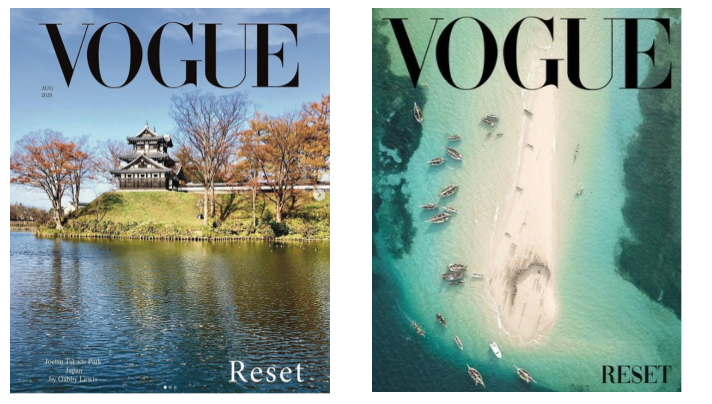Back in August, fashion magazine giant, British Vogue, stirred controversy on social media platforms such as Instagram when it announced its August 2020 issue. The magazine featured an array of 14 landscape covers which were submitted by different photographers as part of the “Reset” theme as an ode to nature. The covers ranged from a tranquil shot of the Joetsu Takada Park in Japan to a paradisiac beach in Ibo island, Mozambique.

Each cover presents itself to be more breathtaking than the next except for one: an alarmingly littered landscape of a beach in the Samana Bay in the Dominican Republic.
The picture was submitted by the Dominican environmentalist artist Carmen Danae, whose family is from the town of Samana. Danae had selected a variety of pictures of Samana’s landscapes, some polluted and some unpolluted. However, editor in chief Edward Enningful picked this one to stir a conversation of a reality many do not wish to acknowledge: pollution.
The cover instantly sparked a debate amongst Dominicans. There was a strong national sentiment, where people claimed that Danae’s actions were unpatriotic. The cover was seen by many as a disservice to the country, an embarrassment, and an attack on the tourism industry which is struggling to recover amidst the COVID-19 pandemic. On one side I do agree that the picture appears to be out of context compared to other featured destinations who also face pollution challenges. If the intention was to raise awareness, why was only one destination highlighted? Additionally, I find it ironic how Vogue magazine, a fashion magazine, who caters to an industry that contributes immensely to unsustainable practices was the chosen platform to carry this debate. On the other hand, along the way, the main subject behind the controversy was lost: plastic. It seemed like a lost opportunity to ask important questions such as: How did the plastic get there? What can we now do to stop the mountains of plastic littering these paradisiac beaches?
I took it upon myself to look more into these questions. Situated in the Caribbean, the Dominican Republic’s geographic location makes it extremely susceptible to natural disasters such as floods, tropical storms and a yearly hurricane season. In 2020 the Dominican Republic was ranked in 74th place from a total of 180 countries with an EPI (Environmental Performance Index) score of 46.3. However, in terms of Waste Management, a category which takes into account the threat of solid waste to human health its ranking plummets to 114th place. The reality is that the Dominican Republic still has a long way to go in terms of adopting long term domestic environmental policies which tackle the growing source of litter and plastic waste. Single use plastics are yet to be banned and practices such as recycling are not reinforced leaving rivers such as the Ozama river in the capital of Santo Domingo to pay the price. However, the issue of plastic pollution in the Dominican Republic has caught the attention of The Ocean Cleanup. The dutch company aims to tackle plastic pollution by cleaning up some of the world’s most polluted rivers and ultimately ridding the ocean of plastic. The company uses advanced technologies to develop its solar powered “Interceptors” which float in the river and allow plastic being carried by currents to pass through it. A conveyor belt moves the filtered plastic to a built in shuttle which when full, carries the accumulated waste in the Interceptos built in dumpster. Once full, the waste is recycled in local waste management facilities.
From this year onwards, its Interceptor 004 will be dedicated to cleaning the Ozama river making it the fourth river out of their goal of tackling the 1000 most polluting rivers around the world. Although the company faced operational setbacks due to Covid19 restrictions and storms, Interceptor 004 is now fully operational and has the capacity to remove up to 50,000 kg of plastic waste. Interceptor 004 may seem to bring to fruition the dream of plastic free landmarks, yet the reality is that as long as the source of plastic pollution is not addressed there will continue to be increasingly more noticeable troubles in paradise…






